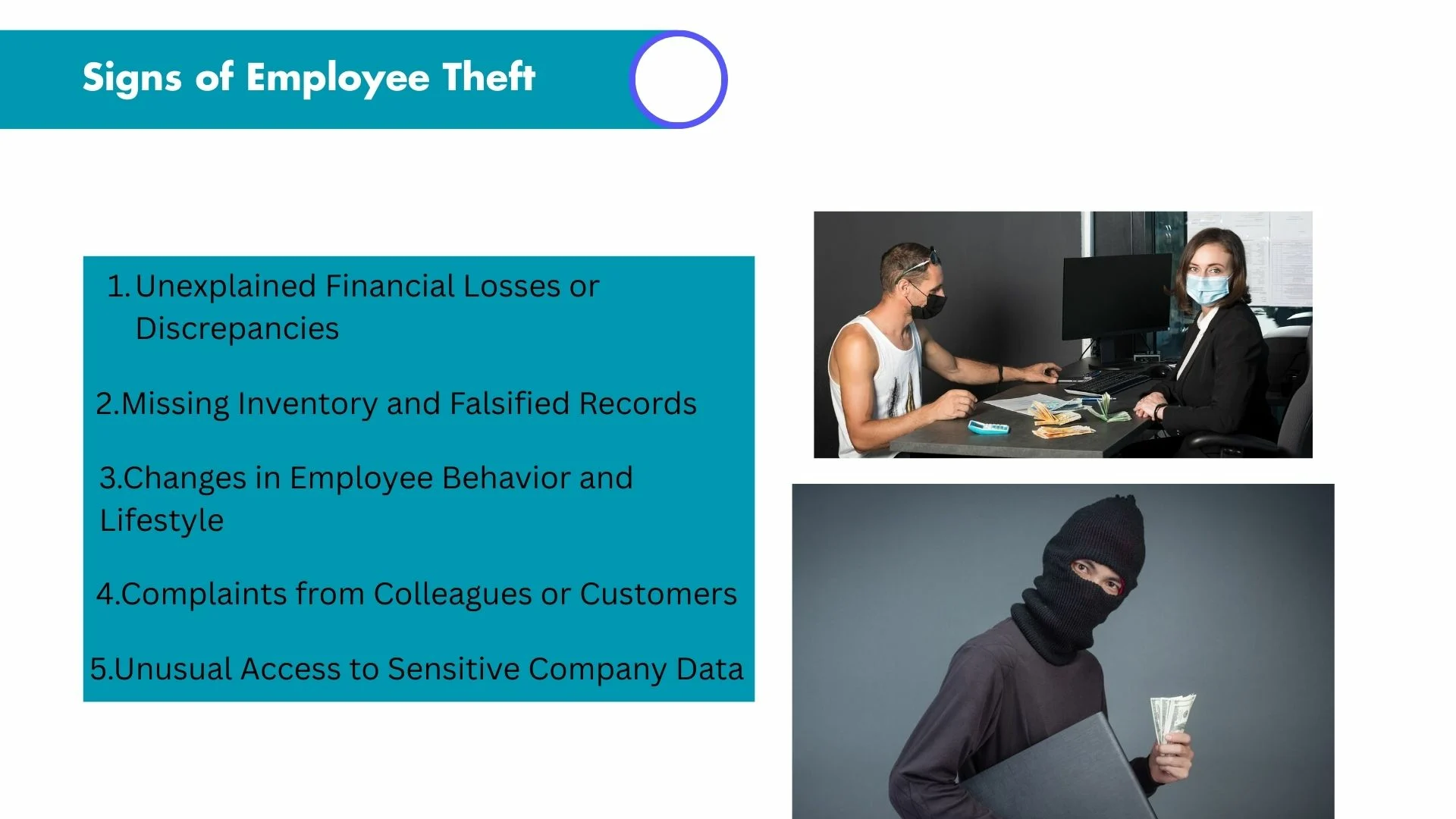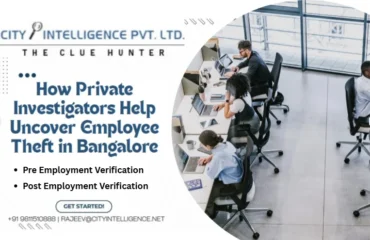Expert Employee Theft Investigation in Delhi – A Guide by City Intelligence
Employee theft is a growing concern for businesses in Delhi, affecting companies of all sizes. From financial fraud to inventory shrinkage, theft within the workplace can significantly impact a company’s profitability and reputation. As businesses strive to maintain security, the need for employee theft investigation in Delhi has never been greater.
A structured investigation process is essential to uncover the truth while ensuring fairness. Without a professional approach, businesses risk legal consequences and internal disruptions. This is where private detective agencies like City Intelligence play a crucial role. With years of experience in detective services in Delhi, our expert investigators use proven techniques to identify theft, gather evidence, and assist businesses in taking appropriate action.
Why Businesses Need a Structured Investigation Process
A haphazard investigation can lead to false accusations, legal troubles, and employee distrust. To handle theft cases effectively, businesses should follow a structured investigation process, which includes:
- Identifying Suspicious Activity – Monitoring financial records, inventory logs, and employee behavior for red flags.
- Gathering Evidence – Conducting surveillance, audits, and digital forensics to collect proof.
- Interviewing Employees – Speaking with employees in a non-confrontational manner to gather insights.
- Analyzing Findings – Evaluating evidence to determine the extent of the theft and identify the responsible party.
- Taking Action – Implementing disciplinary measures, recovering stolen assets, and reinforcing security policies.
By following these steps, businesses in Delhi can handle employee theft professionally and mitigate future risks.
The Role of Private Detective Agencies Like City Intelligence
Private detective agencies in Delhi, such as City Intelligence, specialize in conducting discreet and efficient employee theft investigations. They deploy advanced surveillance techniques, background verification, and forensic analysis to uncover fraud and theft within organizations. With a professional approach, they help businesses identify perpetrators, recover losses, and prevent future incidents.
Understanding Employee Theft
Employee theft refers to the unauthorized taking of property or funds by individuals within an organization. This type of theft can occur in various forms, ranging from small-scale pilferage to large, organized schemes. Unlike external theft, employee theft involves individuals who already have trusted access to the company’s resources, making the consequences particularly damaging. This betrayal of trust not only results in financial losses but can also erode the moral fabric of an organization.
The complexity of employee theft lies in its subtle manifestations. It can be as overt as stealing cash or as covert as manipulating financial records. In some cases, the methods evolve with technological advancements, making prevention and detection even more challenging. Recognizing and understanding these diverse forms is the first step toward effective management and prevention.
Definition and Types of Employee Theft
Employee theft can be classified into several distinct types, each with its own characteristics and methods of execution. Here are some of the most common forms:
- Cash Theft: Direct misappropriation of money from the cash register or safe. This is often the most visible form of theft and is commonly seen in retail and hospitality industries.
- Inventory Theft: Involves employees stealing physical products or inventory items. This can be particularly damaging in sectors such as manufacturing and retail.
- Expense Reimbursement Fraud: Employees submit false claims or inflate expenses to receive unwarranted reimbursements. This type of fraud can occur in any industry that offers travel or operational expense claims.
- Payroll Fraud: Occurs when employees manipulate timekeeping systems to inflate hours worked or create “ghost employees” on the payroll.
- Data Theft: In the digital era, sensitive company information can be stolen, which may include customer data, proprietary information, or trade secrets.
- Intellectual Property Theft: Employees may steal ideas, designs, or inventions for personal gain or for the benefit of a competitor.
- Time Theft: This subtler form of theft includes activities where employees engage in non-work related activities during work hours, indirectly costing the company in lost productivity.
Common Industries Affected by Workplace Theft in Delhi
Delhi, being a bustling metropolitan hub, has a diverse range of industries that are vulnerable to employee theft. Some of the most commonly affected sectors include:
- Retail: With a high volume of cash transactions and extensive inventory, retail businesses are frequent targets. The fast-paced nature of retail makes it challenging to track every transaction, opening doors for opportunistic theft.
- Hospitality: Restaurants, hotels, and cafes often deal with significant cash flow and inventory. Employee theft in these settings can range from under-reporting sales to skimming cash from registers.
- Manufacturing: This sector faces risks related to inventory and raw materials. The sheer volume of goods and the complex supply chain can mask discrepancies, making theft detection more difficult.
- Logistics and Warehousing: With vast inventories stored in large facilities, these industries are prone to internal pilferage. The lack of stringent monitoring systems often exacerbates the issue.
- Information Technology: In the age of digital transformation, IT companies are increasingly at risk for data theft. Employees with access to sensitive digital assets may misuse them for personal gain or sell them to competitors.
Each of these industries has unique challenges when it comes to preventing and detecting theft. Tailored risk management strategies are necessary to combat these issues effectively, making it imperative for businesses to continuously evaluate their internal controls.
How Employee Theft Affects Business Reputation and Financial Health
Employee theft not only creates immediate financial setbacks but also has long-lasting effects on a company’s reputation and financial health. When a business falls victim to internal theft, it often faces a domino effect of consequences that extend far beyond the monetary loss. Financial discrepancies may lead to mismanagement of funds, hampering the company’s ability to invest in growth opportunities. Additionally, such incidents erode customer trust, as stakeholders perceive the organization as lacking robust controls and accountability measures. This loss of trust can result in decreased sales and long-term brand damage.
Recognizing the Signs of Employee Theft in the Workplace

Employee theft is a pressing concern for businesses, leading to significant financial losses and eroding trust within the organization. Identifying the early indicators of such behavior is crucial for timely intervention. Here are key signs to watch for:
Unexplained Financial Losses or Discrepancies
When financial records reveal anomalies without clear explanations, it may point to internal malfeasance. Regular audits and vigilant monitoring can help detect these issues early on.
Missing Inventory and Falsified Records
A consistent pattern of absent stock or manipulated documentation can indicate dishonest activities. Implementing stringent inventory controls and routine checks is essential to uncover and address such discrepancies.
Changes in Employee Behavior and Lifestyle
Notable shifts in an employee’s demeanor or sudden lifestyle upgrades that don’t align with their salary could be red flags. Such changes might suggest involvement in unauthorized activities.
Complaints from Colleagues or Customers
Feedback regarding overcharging, incorrect billing, or other irregularities from staff or clients should not be overlooked. These grievances can shed light on potential internal theft or fraud.
Unusual Access to Sensitive Company Data
Employees attempting to access confidential information without a valid reason may have ulterior motives. Monitoring and restricting access to sensitive data is vital to safeguard the company’s assets.
Addressing employee theft requires a proactive and comprehensive approach. City Intelligence offers specialized Employee Theft Investigation in Delhi services for businesses in Delhi seeking expert assistance. With over 24 years of experience, they provide discreet and effective solutions to protect your organization from internal threats.
Steps to Conduct an Employee Theft Investigation
Employee theft can lead to significant financial losses and damage the reputation of a company. Conducting a thorough Employee Theft Investigation in Delhi is essential for businesses to safeguard their assets. City Intelligence, a leading private detective agency in Delhi, specializes in handling corporate theft cases with confidentiality and expertise. Below are the essential steps to conduct an effective employee theft investigation.
- Identifying Red Flags
Recognizing the warning signs of employee theft is the first step. Look for unexplained discrepancies in financial records, unusual behavior, or significant lifestyle changes among employees. Early detection through discreet monitoring and random audits helps prevent larger issues down the road.
- Securing Digital and Physical Evidence
Once suspicions arise, it’s essential to collect solid evidence. This includes reviewing CCTV footage, access logs, and financial records. Forensic accounting can reveal inconsistencies, ensuring that any gathered evidence is reliable and legally admissible if further action is needed.
- Conducting Employee Interviews
After evidence is collected, interviewing involved employees is crucial. This step involves asking strategic questions while carefully observing body language and verbal cues. The aim is to gather more insights without violating employee rights, ensuring that the investigation remains fair and respectful.
- Working with a Private Detective Agency in Delhi
Engaging a professional detective agency like City Intelligence can streamline the investigation process. These experts use advanced techniques and maintain strict confidentiality, ensuring that the investigation is thorough and all evidence is properly collected for legal and internal use.
- Legal Actions and Disciplinary Measures
Once wrongdoing is confirmed, the next step is to take legal and disciplinary action. This may involve filing a police report or implementing internal disciplinary measures. Ensuring that all actions are in line with legal protocols helps safeguard the company from further complications.
Conclusion
A well-structured employee theft investigation in Delhi is crucial to maintaining workplace integrity and financial security. Businesses must adopt a proactive stance to prevent internal fraud, minimize risks, and safeguard assets. City Intelligence, a reputed detective agency in Delhi, specializes in discreet, efficient, and legally compliant investigations to help businesses tackle theft issues effectively. By leveraging expert assistance, companies can deter potential threats and ensure a secure working environment. Prioritizing workplace security today can prevent major financial losses tomorrow—act now to protect your business.

Rajeev Kumar – CEO, City Intelligence Pvt Ltd
Rajeev Kumar running a leading private detective agency in Delhi with over 24+ years of experience in private and corporate investigations. As a certified member of APDI and WAD, he has successfully solved 4,700+ complex cases across India. His expertise in undercover operations, corporate fraud detection, and advanced surveillance techniques makes him one of the most trusted detective experts in India.
Media Coverage:
Mid-Day Feature
Startup Story Feature
India Saga News
YouTube Interviews:
Exclusive Interview on Investigations
Case Study & Success Stories
Connect with Rajeev Kumar:
LinkedIn
City Intelligence Official Website



